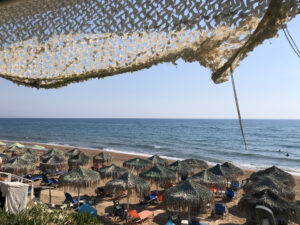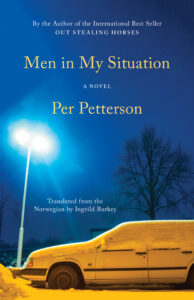The ethos of the modern world is defined by immigrants. Their stories have always been an essential component of our cultural consciousness, from Isaac Bashevis Singer to Isabel Allende, from Milan Kundera to Yiyun Li. In novels, short stories, memoirs, and works of journalism, immigrants have shown us what resilience and dedication we’re capable of, and have expanded our sense of what it means to be global citizens. In these times of intense xenophobia, it is more important than ever that these boundary-crossing stories reach the broadest possible audience.
Antropófaga
By ANANDA LIMA
Excerpt from Craft.
She devoured tiny Americans that slid out of a vending machine. Their thin metallic plastic packages almost opened themselves when punctured. Emerging with their tiny hands on either side of the rip, they declared their nutritional value (calcium, sugar, fat, 350 mg of synthetic protein). So many times she decided to diet and promised: no more Americans. But she always walked by, with an eye on the spot between the Ruffles and the Doritos, salivating. And before thinking, there she was again, inserting the coins, hot and sweaty from her palms, into the machine’s mouth.
In the Rain, Sugar Runs in Tears
By GEIMY COLÓN
Except from Nobody Here Plays Little Kid Games.
The blackout falls over the neighborhood like thick ink, darkening everything, forcing things into slow motion. It is like night on night—a doubly deep darkness. There are no stars lighting the block in the rainstorm.
Heavy rain hitting the roof runs off the metal awning over the terrace. The rain insulates the house in a liquid static that blocks out all other sounds. The musicality of this static brings peace to the house. Inside the house, the refrigerator ceases its loud humming. Fans stop whirring. The buzzing of the overhead lights grows silent.
Excerpt from BETWEEN THIS WORLD AND THE NEXT
“Mr. Federenko come soon,” the driver said, lugging Fearless’s duffel up the stairs.
Above, on the landing, he saw a blur of pattering feet and what looked like a cowled figure disappearing through a door—but it must have been his mind playing tricks, he told himself. And the rain was disorienting; it hammered on the stairwell’s skylight like a hundred hundredweight of masonry nails tossed from above. Fearless’s work as a war photographer had taken him everywhere save Asia, so the sheer speed and volume of the monsoon surprised him. When the driver led him through the open door of a whitewashed apartment, he was stunned to see the water reaching pedestrians’ knees from its balcony, the thoroughfares now canals traversed by cars and tuk-tuks that left parabolae of foam rippling in their wake. Clothes stuck to people’s skin. Ropes of water twisted from awnings.
Brenda Smith
By A. MOLOTKOV
Excerpt from A Bag Full of Stones.
The dry spot on the pavement vaguely resembled a human shape. “Where’s the body?” Detective Brenda Smith asked.
The residential street was lit with soft yellow lights floating over a long hedge. The moon sat on top of a building on their left. The air smelled of water: rain, rot, autumn. It was 6:17 a.m. Brenda was cold, her skin tight from the sense of dread and responsibility.
Between States

Pine Mountain Valley, Georgia
He is Risen signs go up in the neighboring yards, making sure I remember Easter.
On Easter in 1865, Union troops attacked Columbus, Georgia, the city closest to my current address. This was the Civil War’s last battle, and useless. The Confederates had surrendered in Virginia already, but, this far south, neither side knew.
Belonging Is a Complicated Thing: An Interview with Viet Thanh Nguyen
JENNIFER ACKER speaks with VIET THANH NGUYEN

Viet Thanh Nguyen visited Amherst College in February 2022 in the joint roles of Presidential Scholar and LitFest headliner. In his live conversation with The Common’s editor-in-chief Jennifer Acker, he deployed humor and refreshing honesty to discuss his path to publishing his Pulitzer Prize-winning novel The Sympathizer and its best-selling sequel The Committed. The conversation touched on the complexities of Vietnamese diasporic identity as well as his desire to expand the world of literature to encompass critical thought, breaking through the traditional literary bubble to allow for politics, history, and more. This interview is a collaboration between The Common and Amherst College’s LitFest and is an edited and condensed version of the live conversation.
Friday Reads: September 2022
Curated by SOFIA BELIMOVA
For our September round of Friday Reads, we spoke to two TC contributors, who recommended vibrant prose that leaps off the page and compelling poetry that transcends linguistic barriers while echoing with the sound of home.
Translation: On the Greenwich Line
Excerpted from the novel by SHADY LEWIS
Translated from the Arabic by KATHARINE HALLS
Excerpt appears below in English. To read the original Arabic, click here.
Translator’s note
One of the things I like about Shady Lewis’s writing—and the reason I’m so glad it’s appearing in The Common of all journals—is that it’s global in its imagination, and yet deeply rooted in specific places and experiences. The place is Cairo, and the experiences are those of Coptic Christians and young people on the left. From this vantage point, Lewis offers a biting critique of Egyptian society, but one that’s filled with affection for its people. But Lewis has also lived in the UK for a long time, and in the novel excerpted here, On the Greenwich Line, he turns the same critical yet compassionate gaze on its capital city. His setting is a run-down East London borough, and his characters an unlikely cast of desperate migrants and frustrated local government employees. The premise is simple: as a favor to his friend, the protagonist finds himself roped into organizing the funeral of a young Syrian refugee named Ghiyath. The protagonist himself is an Egyptian immigrant who’s lived in London for many years and works as a housing officer for the local council, so he knows all about the absurdities of racism, austerity, and bureaucracy in the UK; he just doesn’t think they concern him, until the fateful day his life collides with Ghiyath’s, and he’s forced to acknowledge just how much he has in common with those who’ve fallen through the cracks. The result is a painful interrogation of how a decade of Conservative austerity has hollowed British society out from the inside, and a devastating portrayal of the migrants and outcasts who are forced to live permanently on the brink of destitution. It’s also a profoundly human story about London and its many lost souls, and for a reader like me who loves the city, Lewis’s writing about London, in Arabic, feels both familiar and arresting. Translating it into English, I hope both to honor its intimate, quotidian London-ness, and to preserve the outsider gaze which enables it to offer up such striking observations as the protagonist’s musing on the “Mosque of the White Chapel”—his Arabic rendition of Whitechapel Mosque. It does us good to return to old sights with fresh eyes.
—Katharine Halls
Coast of Ilia

Photo by Lisa Rosenberg
Gulf of Kyparissia, Ilia, Greece
1. This is the story
of cigarette butts and discarded straws.
Of beach, and sea, and all that mythology
rolled into one bright ball where my child plays











